

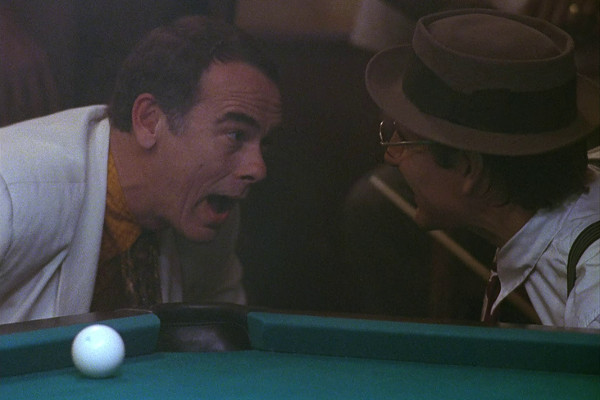
A variable episode where Sam leaps into an aged pool player who must win a match against a loan shark to save his granddaughter. As with Leaping in Without a Net (which followed this in transmission order) it's very much a given what the outcome will be, despite some attempts to add to the suspense. The memorable ending featured in the clips montage of later season opening titles.
There's a slightly toe-curling scene where Scott Bakula performs a cheesy piano duet with his granddaughter (Shari Headley), which didn't feature on the 1993 "Music From" CD release, and an even more toe-curling one in a bank. Although race doesn't feature as a main topic in this episode, there's always something a little disconcerting about seeing a white man in a white writer's script giving a lecture to a black man about how to behave like an honourable black man. It's well-meaning but, at best, trite, and far from the worst example in the series.
Yet while this summary seems like purely detraction, there is some value in the episode: it won an Emmy for Cinematography, the soundtrack is nice (albeit stereotypical) and cult movie lovers will appreciate Dawn of the Dead's Ken Foree putting in a guest appearance. In fact, all involved put in a good effort, including J.W. Smith, who makes the customary "villain" role feel a little more fleshed out than usual in Quantum Leap episodes, his acting elevating what's written on the page. It even, despite the inevitability of the outcome, manages to add some of that much-needed suspense.

Sam leaps in as a Native American who has to take his grandfather Joseph (Frank Sotonoma Salsedo) to a reservation to die. The depiction of other races as seen through the eyes of white writers always risks being stereotyped, and that's certainly a danger here. Joseph's humour is a little too self-consciously "cute" at times, and his obsession with the Redskins is a worry, though not as much as Sam losing his temper and almost committing a scalping.
Despite all this, it's an engrossing little tale. The post-dubbing and continuity in reverse shots can be poor, and the use of stunt doubles is obvious under the gaze of BluRay, but technically it's quite well put together. There is a worry about the mistreatment of animals, as a stunt horse gets Scott Bakula falling on his neck at one point, and, while Bakula normally delivers a very fine performance, he does seem to struggle to find the true emotional centre of the character during his "crying" scenes at the end... though, to his credit, he is carrying Salsedo at the same time.
Bakula makes it all look so easy, having to deliver a wide range of skills each week, that it's sometimes hard to believe that on occasion he isn't able to quite reach an emotional peak that he normally nails. Also having an off day is Dean Stockwell, who doesn't get a lot to do, and, when he does, mainly has to give reactions to Joseph's witticisms, which seems him sometimes get over-the-top.
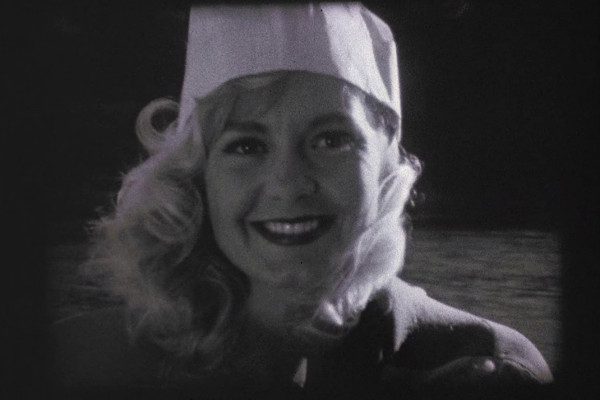
Good Night, Dear Heart is one of the more thematically complex episodes of the series, with some nice lines in a script that won an Edgar Award. Featuring a lesbian that killed her lover, it's the first time homosexuality is referenced in Quantum Leap, and became somewhat controversial as a result.
The notion that featuring gay people on TV was in any way "controversial" or "edgy", is, of course, something slightly shocking today (though still not that shocking... we've yet to move on that far), but this was a series that had advertisers threatening to pull out over season three's Running For Honor.
Speaking of Running For Honor, there was speculation that the episode was written as a direct reaction to the negative reaction to this one, presenting gay people in a more positive light after Good Night, Dear Heart's "killer lesbian" theme. Quantum Leap also had a short-lived comic book series for the short-lived company Innovation Publishing, which released a sequel to the episode. Andy Mangels wrote Up Against a Stonewall, which aimed to rehabilitate the character of the murderer, downplaying her role as accidental death, and having Sam leaping into her after she's released from a 12 year prison sentence for manslaughter.
Is the episode homophobic? Well, not particularly - gay people can commit murder too, after all - though made in an age where gay people simply didn't feature on television, it must have been disheartening to see that the first gay character in Quantum Leap was a murderer.
Yet while the discussions surrounding the episode are quite intriguing, it all distracts from the fact that the episode is... well, a little dull. It predates Twin Peaks by over a month with its "dead girl in the river" storyline, and the ending with Sam at a snow-bedecked grave is beautiful, but what comes in between lacks true involvement, if only because most viewers will be ahead of Sam in piecing all the clues together. Its high placing here is a testament to the innate quality of the piece, rather than any particular viewing enjoyment.

One of the most lauded episodes, as Sam leaps into a man with mental learning difficulties. In fact, the episode was so popular that it was reprised twice: Sam mentally becomes Jimmy for moments of Shock Theater (1991) and leaps back into Jimmy in Deliver Us From Evil (1992).
One problem with series that are, to use the pejorative term, "politically correct", is that what is regarded as acceptable language shifts over time, so that what was once an attempt to be supportive can, three decades after the fact, seem mildly offensive. There are still a sizeable amount of Native Americans that refer to themselves as "American Indians", meaning Freedom still holds up, certainly far better than the vaguely transphobic undertones of What Price Gloria?. But here Sam's revelation that he's "retarded" isn't one that holds up so well in 2019.
As with The Americanization of Machiko, a reason is given for prejudice (sadly, the real world doesn't always work that way) and so we get another "quick fix" in the last five minutes. While it's easy to see the machinations of the writer at work, it's still a little hard not to get caught up in the emotions of the moment, no matter how contrived they might be.
Particularly frustrating in this episode is Sam, who allows himself to be seen when talking to Al, which just looks to observers as if he's talking to himself and does, in this case, more than double the usual harm this causes. (Such scenes would be perhaps better served if the actor behind the mirror reflection acted out the POV of other characters).
Lastly, there's another famous guest star in the series, a programme that had roles for fairly famous names such as Roddy McDowall, and names that became famous years after they appeared in the series... Jennifer Aniston, for example, was still two years off appearing in Friends when she had a guest role in Quantum Leap's final season. Other famous names involved in the programme included Tia Carrere, Teri Hatcher, Neil Patrick Harris, Peter Noone, Joseph Gordon-Levitt, Bob Saget and Brooke Shields. Here Jimmy's main protagonist is Michael Madsen, who wasn't exactly unknown, but was still a couple of years away from breakout roles in Thelma and Louise and Reservoir Dogs.
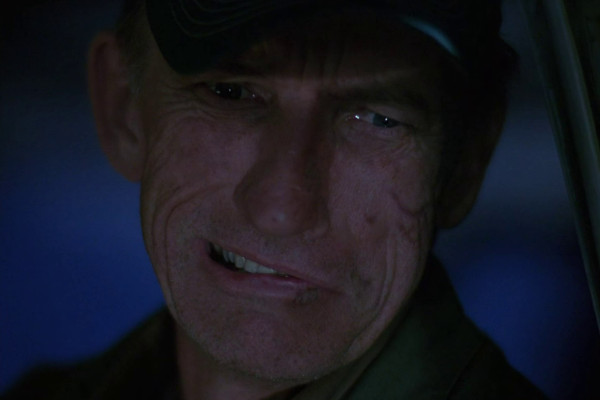
An enjoyable episode that sees Sam as the mother of three young children, one of whom is destined to be murdered. There's a lot of firsts in this instalment: it's the first episode where a child can see Sam and Al as they really are; it's the first where we learn that Sam can perform just about every martial art known to man; it's the first to use the new spoken introduction (by Lance LeGault, but by Deborah Pratt from the following episode on); and, lastly, it's the first episode set in the 1980s. This is something of a surprise, looking back, just how few leaps are based around the decade that spawned the show: just 9 episodes are set there, and the vast majority of them (5 episodes) take place during season four.
The episode isn't perfect, of course: the characters aren't drawn with massive depth, not unexpectedly for a story that has just over 40 minutes, credits omitted, to tell its tale, and, as is often the case with this series, there are a handful of lines that are badly dubbed, proving that no matter how good the image is on BluRay (and it's frequently fantastic when compared to the DVDs) the audio can't compete. Then there's the fact that the "teenagers" involved in the episode are obviously played by actors much older than the parts, including a 15-year-old temptress played by an actress in her mid 20s. Oh, and there's also Al's most fatuous advice, with "Watch out for the knife, Sam, it could be sharp!"
But what really stands out is the unlikely subplot of a van that goes around kidnapping people with almost no MO. The idea that a van with blackened windows spends several hours crawling around town looking for victims is one thing, but the occupants seem equally pleased with underage boys as they are adult women... not to mention that both resemble a cartoonish caricature of what a sex offender would look like, all twisted mouths, scars and licking lips. It's questionable stuff, because it puts the concept of sex offenders in the realms of easily-identified "monsters", figurative strangers in the woods... whereas the vast majority are known to their victims, and don't use brute force as seen here. Rather than acting as a warning to viewers at home, it inadvertently encourages viewers to look outside the home where most of the true monsters will exist.
Perhaps even more problemmatical is that when Sam inevitably saves the day by knocking out the two perverts, they're just left unconscious while Sam drives his "son" away to safety, becoming one big loose end. Thankfully this was somewhat cleared up by the Quantum Leap Podcast, which featured Deborah Pratt on a commentary for this episode, confirming her idea of what wasn't shown on screen, but did take place off it: "Absolutely they get arrested, and go to jail for the rest of their lives. Paedophiles in jail, 'short eyes', they call 'em."
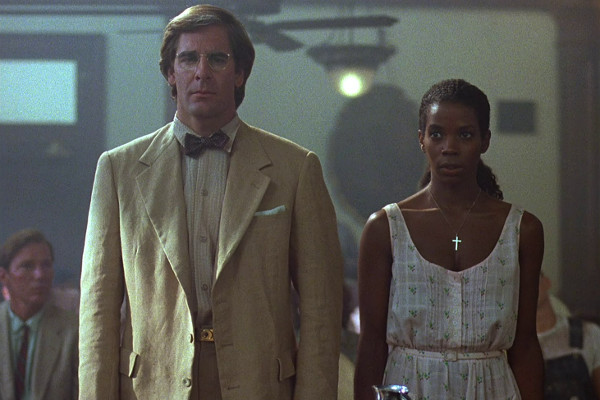
Sam does his best Atticus Finch as he leaps in as a man who has to defend Delilah, a black woman on trial in 1950s Louisiana. Deborah Pratt's script is tighter than many of the other season two instalments, with the characters more three-dimensional and thought out, and it makes for a more adult screenplay.
Like the majority of the race-based episodes, it was written by Deborah Pratt, a black woman who would go on to voice Ziggy, the project computer. This does make it somehow more palatable, given that it's a series featuring a white man going through time to empower black women. With Al seemingly not on hand with his rapping skills, Sam ends the episode by urging Delilah to learn to read, which is well-meaning, but does, in effect, make him the ultimate mansplainer.
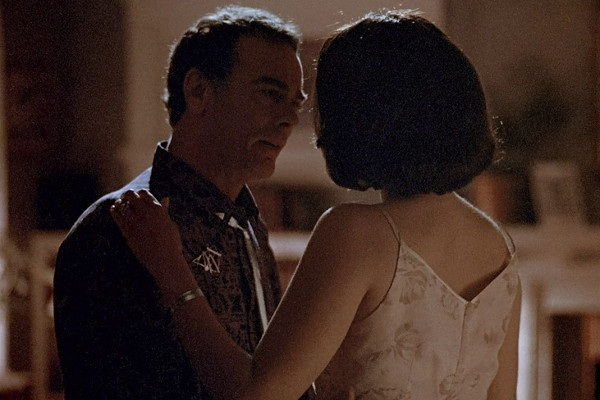
Each week Quantum Leap has a mission to get viewers to care about completely new characters in a short space of time. M.I.A. begins a three-episode run (continued in season three) where viewers get to experience the lives of the characters they naturally care about most... the two leads.
M.I.A. is a heartbreaking tale, where Sam has leapt into a time period where Al's wife, believing he's been killed in Vietnam, meets a new partner. Al insists that Sam is there to make sure that his wife doesn't move on, and that his failed marriages and attachment issues all stem from losing the love of his life.
33 directors worked on Quantum Leap, with perhaps the most notable being Scott Bakula himself, directing three episodes during the final two seasons. However, the most prolific were James Whitmore, Jr. (15 episodes), Joe Napolitano (13 episodes) and Michael Zinberg (10 episodes). Half of Zinberg's episodes were from season two, including this one, possibly the finest episode of the whole series.